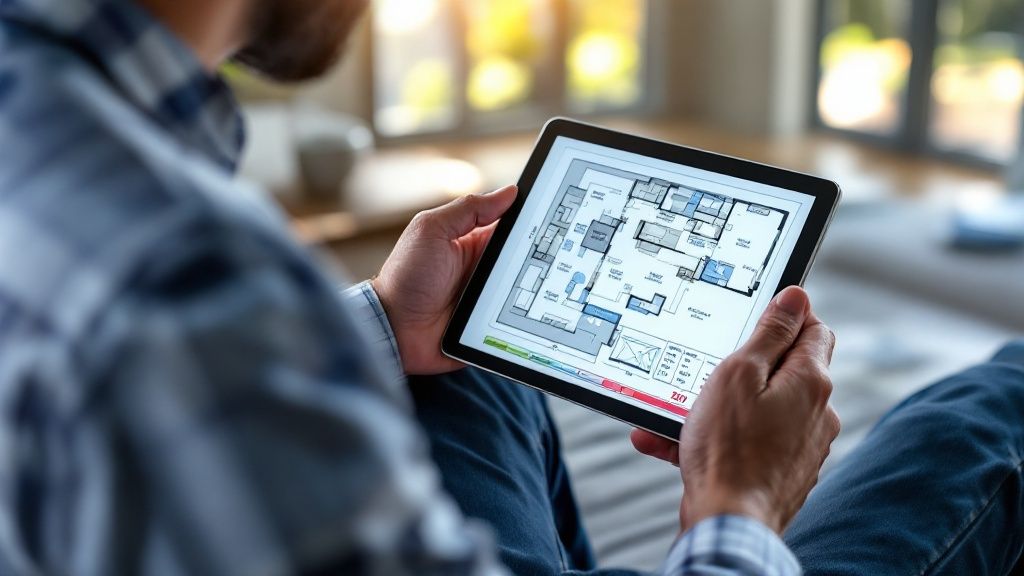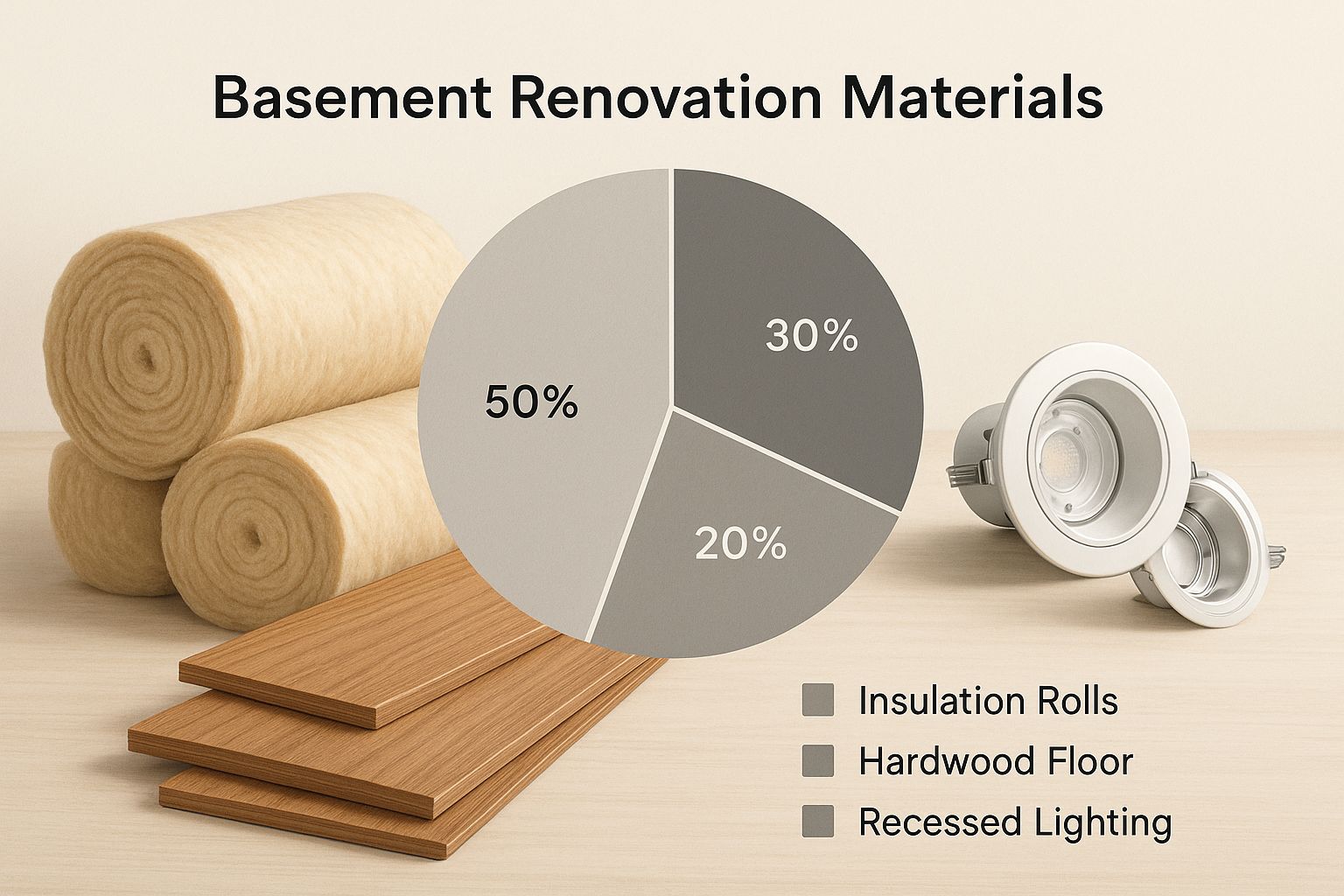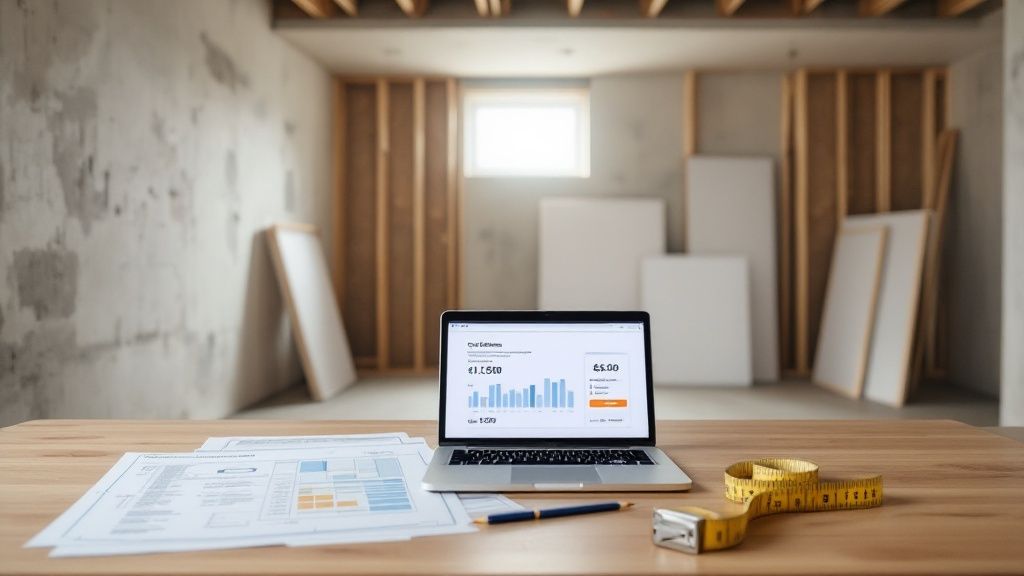Before you start dreaming up a home theater or a swanky guest suite, let's talk numbers. Getting a handle on the budget is the first, and arguably most important, step. While a good basement finishing cost calculator is your best bet for a tailored estimate, most projects land somewhere between $7,000 to over $75,000. That's a huge range, I know. It all comes down to the size of your space, where you live, and the features you can't live without.
This guide is all about breaking down what goes into that final price tag.
What Does It Really Cost to Finish a Basement?

Trying to nail down a single price for finishing a basement is a bit like asking how much a car costs. A basic sedan is a world away from a luxury SUV, right? The same logic applies here. Are you picturing a simple, functional family room, or are we talking a high-end entertainment zone with a custom bar and a full bathroom? The answer completely changes the budget.
My goal is to cut through that ambiguity and give you a solid financial starting point. When you understand the core costs, you can plan with confidence and sidestep those nasty surprise expenses that can derail a project.
National Averages: A Good Starting Point
Across the country, the cost to finish a basement generally runs from $7 to $23 per square foot. So, for a typical 1,000-square-foot basement, you're looking at a ballpark figure between $7,000 and $23,000.
Keep in mind that labor is a huge chunk of that—usually about 40% of the total budget. You also have to factor in permits, which can add another $1,200 to $2,000 depending on how complex your plans are.
The big takeaway here is that your total investment is a mix of materials, labor, and administrative costs. If you overlook any of these three pillars in your initial math, you're setting yourself up for budget overruns.
How Your Choice of Finishes Shapes the Budget
The quality of the materials you choose and the complexity of your design are the biggest drivers of your final cost. It's simple, really: a wide-open, simple room will always be cheaper than carving out multiple rooms with custom-built features.
Here's a quick look at how different finish levels impact the price tag.
Average Basement Finishing Cost Per Square Foot
This table gives you a quick snapshot of what to expect based on the level of finish you're aiming for. It's a great tool for setting some initial budget expectations.
| Basic/DIY | $7 - $15 | $7,000 - $15,000 |
| Mid-Range | $20 - $50 | $20,000 - $50,000 |
| High-End/Luxe | $50 - $75+ | $50,000 - $75,000+ |
As you can see, the jump from a basic finish to a high-end one is significant. Let's break down what that actually means.
- Basic Finish: Think standard drywall, simple carpet or vinyl flooring, and basic lighting. This is perfect for creating a functional playroom or a clean storage area without breaking the bank.
- Mid-Range Finish: Here, you might upgrade to laminate flooring, add recessed lighting, and include some built-in shelving. This is also where you might add a small kitchenette or a half-bath.
- High-End Finish: This is where you go all out. We're talking luxury materials like hardwood floors, custom cabinetry for a full wet bar, a dedicated home theater system, and a full bathroom with premium fixtures.
Figuring out which of these tiers fits your vision is key to building a realistic budget. As you think about this, you might find it helpful to read our deeper dive into what goes into a full basement remodel cost. It's a great primer for getting the most out of any cost calculator.
Breaking Down Where Your Money Goes
When you start planning a basement remodel, it's easy to get fixated on the total price tag. But a finished basement isn't just one big expense—it's actually a collection of smaller, distinct projects that all come together. The real key to building an accurate budget, and making the most of any basement finishing cost calculator, is to understand these individual pieces.
Let's pull back the curtain on the "Big Five" cost drivers that will make up the bulk of your investment.
This image breaks down the core materials you'll be looking at, which is a great starting point for seeing where the money physically goes.

From the insulation behind the walls to the flooring under your feet and the lights overhead, every decision you make has a direct impact on the final number. It’s all about striking that perfect balance between the quality you want and the budget you have.
Framing and Drywall Your New Space
Before you can even think about paint colors, you have to build the bones of your new rooms. Framing is what turns that open concrete shell into a defined space with walls. Your main choice here is between traditional wood studs and modern steel studs. Wood is usually the more budget-friendly option, but steel’s resistance to moisture and pests is a huge plus for any below-grade project. It’s a trade-off worth considering.
After the frame is standing, it’s time to hang the drywall. This is the moment your basement starts to feel less like a cellar and more like actual rooms. The cost for this phase—which includes materials, labor for hanging, taping, and finishing—typically runs between $1.50 and $3.50 per square foot of wall surface area. If you want to get really granular, we have a detailed guide on the https://buildnp.com/blogs/cost-of-drywalling-basement that covers all the details.
Electrical and Plumbing Systems
Next up are the guts of the operation: the systems that bring your new space to life. Electrical work is a non-negotiable part of the process, and for safety and code reasons, it absolutely must be handled by a licensed pro. This covers running wires, installing outlets, switches, and all your lighting fixtures. A straightforward electrical plan might cost around $1,000 to $3,000, but that number will climb with every recessed light or specialized circuit you add for things like a home theater.
Plumbing can also be a major line item, especially if a bathroom or wet bar is part of your dream design. Tapping into existing supply and drain lines can set you back anywhere from $1,000 to $5,000, and sometimes even more. The final cost really depends on how complex the job is and whether your contractor needs to break through the concrete slab to run new pipes.
Flooring Your Finished Basement
The flooring is what truly sets the tone for the finished space, and this is one area where the cost can swing dramatically based on your style and practical needs.
- Luxury Vinyl Plank (LVP): This has become a go-to for basements. It looks great, handles moisture like a champ, and usually costs $2 to $5 per square foot.
- Carpet: Nothing beats carpet for warmth and comfort, which is why it's a top pick for basement family rooms and bedrooms. Plan on spending $3 to $7 per square foot installed.
- Engineered Hardwood or Tile: If you’re going for a more premium look, these options are fantastic but will sit at the higher end of the budget, often from $5 to $10 per square foot or more.
To give you a clearer picture, here's an itemized breakdown of where your money typically goes in a basement finishing project. This can help you see how the different components contribute to the total cost.
Itemized Cost Breakdown for a Basement Finish
| Framing & Drywall | $4,000 - $9,000 | Square footage, complexity of the layout (number of rooms/corners), choice between wood and steel studs. |
| Electrical Work | $1,000 - $3,000+ | Number of outlets, switches, and light fixtures; need for a subpanel; custom lighting (e.g., recessed). |
| Plumbing | $1,000 - $5,000+ | Adding a bathroom or wet bar, distance to existing plumbing lines, need to break concrete. |
| Insulation | $1,000 - $2,500 | Type of insulation (fiberglass vs. spray foam), R-value required by local code. |
| Flooring | $2,000 - $7,000 | Material choice (LVP, carpet, tile), total square footage, subfloor preparation needs. |
| HVAC | $1,000 - $2,000 | Extending existing ductwork, adding vents, and ensuring proper airflow and climate control. |
| Painting & Trim | $1,500 - $4,000 | Quality of paint, amount of trim work (baseboards, crown molding), complexity of the job. |
| Permits & Fees | $500 - $2,000 | Varies significantly based on your municipality's requirements and the scope of the project. |
This table provides a solid framework for budgeting, but remember that every project is unique. Your final costs will depend on the specific choices you make for each of these components.
How Your Location Impacts the Bottom Line

While a basement finishing cost calculator gives you a great ballpark figure, it's crucial to remember that those numbers are based on national averages. The single biggest variable that will move your budget up or down is, simply, your zip code. The same 1,000-square-foot basement finish can have wildly different price tags depending on where you live.
Why the huge swing? It all boils down to local economics. The cost of living, demand for skilled trades, and even the price of gas to get materials to your site all play a part. A licensed electrician in a busy city like Denver has higher overhead and can command a much higher hourly rate than one in a small, rural town.
A Regional Snapshot of Labor and Material Costs
Think about the supply chain for a moment. All that drywall, lumber, and flooring has to get to your local supplier. If you're in a remote area, far from major distribution centers, you’re going to see those shipping costs reflected in your material quotes. It’s the same story with labor—a construction boom in your region means every good contractor is busy, and that high demand naturally drives up prices.
Let’s put this into perspective with a quick comparison:
- High-Cost Area (e.g., a major suburb): You're looking at premium labor rates. An electrician might bill out at $100-$150 per hour. You'll also likely pay material delivery fees, and permit costs are often steeper due to more rigorous city oversight.
- Lower-Cost Area (e.g., a smaller city): That same electrician’s rate could be a more manageable $65-$95 per hour. Materials might be sourced closer, cutting down on delivery fees, and permits are often less expensive.
When you spread those differences across all the trades involved—framers, plumbers, drywallers, painters—it's easy to see how the final bill can change dramatically.
A project that costs $45,000 in one part of the country could easily cost $65,000 or more elsewhere for the identical scope of work. This is why localizing your estimate is not just a suggestion—it's essential for a realistic budget.
Don't Forget Local Codes and Market Trends
Beyond the obvious costs, local building codes can add another layer of expense. Your municipality might have strict requirements for insulation R-values, the size of your egress window, or specific types of electrical wiring. Meeting these codes can mean buying more expensive materials or paying for extra labor, both of which hit your bottom line.
The market in Colorado is a perfect example of these high-demand conditions in action. Finishing a basement there often runs between $65 and $105 per square foot. For a typical 1,000-square-foot space, this means a basic project starts around $65,000, while a more high-end remodel can easily top $120,000. Those numbers are a direct result of the competitive labor market and high demand in the metro areas. You can get a deeper look into basement finishing costs in Colorado here.
The takeaway is simple: use national averages as your starting point, but don't stop there. The only way to get a true picture of your potential costs is to dig into local rates and, most importantly, get multiple quotes from reputable contractors in your area.
DIY vs. Pro: Where Can You Actually Save Money?
Labor is a huge piece of the basement finishing puzzle, often eating up 40% or more of your total budget. That number alone makes the do-it-yourself route look incredibly appealing. But before you start binge-watching framing tutorials on YouTube, you need to have an honest conversation with yourself.
The choice between hiring a general contractor, acting as your own GC, or going full DIY impacts a lot more than just your bank account. We're talking about your timeline, your stress level, and the final quality of the work. Making the right call here is less about ambition and more about a realistic assessment of your skills, time, and tolerance for things going wrong.
What Does a General Contractor Actually Do?
Think of a general contractor (GC) as the director of your basement renovation movie. They're the ones hiring and scheduling all the different trades—the framers, electricians, plumbers, drywallers, and painters. They also pull the permits, line up the inspections, and manage all the material orders, making sure the whole project flows smoothly and, most importantly, meets building codes.
Of course, this service comes at a price. A GC typically adds a markup of 15% to 25% on top of the total cost of materials and labor. If your project comes in at $50,000, that means you're paying the GC somewhere between $7,500 and $12,500 for their management. It sounds like a lot, but what you're buying is expertise, access to their network of vetted pros, and one person to call when something inevitably needs attention.
A great GC doesn't just make phone calls. Their real value is in spotting potential problems before they happen, navigating the maze of local building codes, and solving issues on the fly that would send the average homeowner into a panic. They prevent costly mistakes.
The Sweet Spot for DIY Savings
Even if you hire a GC to manage the big stuff, there are still plenty of ways to roll up your sleeves and save some serious cash. The trick is to pick jobs that are high-impact but low-risk. In other words, tasks that are hard to mess up catastrophically.
Here are some of the best places for a handy homeowner to jump in:
- Painting: This is the classic DIY win. It's more about patience and prep work than anything else, and the labor savings can easily run into the thousands.
- Installing LVP Flooring: Modern luxury vinyl plank is practically designed for DIYers. Most systems just click together, making it a straightforward weekend project.
- Installing Trim and Baseboards: While it requires a bit of precision (and a miter saw), learning to cut and nail trim is a very achievable skill. This can save you a bundle on finish carpentry.
- Demolition: Got some old, non-structural walls or dated finishes that need to go? A sledgehammer and a wheelbarrow can be your best friends. Tearing things out yourself is a fantastic way to cut costs right from the start.
When to Absolutely Call in a Professional
Then there are the jobs that carry way too much risk. Messing these up could jeopardize your family's safety or the structural integrity of your home. Any basement finishing cost calculator will treat these as non-negotiable professional expenses for a reason.
Don't even think about DIYing these—always hire a licensed pro:
Electrical: This is non-negotiable. Faulty wiring is one of the leading causes of house fires. A licensed electrician understands load calculations, safety codes, and how to pass an inspection.
Plumbing: A tiny, slow leak behind a brand-new wall can lead to thousands in mold and water damage. Pros know how to properly vent drains, sweat copper lines, and ensure everything is leak-free for the long haul.
HVAC: Tapping into your home's ductwork isn't as simple as it looks. It requires understanding airflow and system balance to make sure your new space is comfortable without overtaxing your furnace and AC.
Major Structural Changes: If your plans involve touching the foundation, moving load-bearing walls, or cutting a new opening for an egress window, you need an expert. This is engineer and specialty contractor territory, period.
Budgeting for Custom Features and Upgrades
Once you've got the essentials pinned down—the walls, floors, and basic lighting—it's time for the fun part. Custom features are what really make a basement feel like yours. This is where your vision for a sleek wet bar, a cozy home theater, or a private gym starts to take shape.
But this is also where your budget can get away from you if you're not paying attention. Knowing the real-world costs for these popular add-ons helps you prioritize what matters most. It lets you use a basement finishing cost calculator with a lot more accuracy, plugging in real numbers instead of just guessing.
Let's look at what some of the most common upgrades actually cost to add to your project.
Adding a Basement Bathroom
A bathroom is easily one of the smartest and most valuable upgrades you can make. Even a small powder room makes the whole basement infinitely more usable. The final price tag, however, can swing wildly depending on what you have in mind.
- Half-Bath (Powder Room): This is your most budget-friendly route. For a simple toilet and sink, you're usually looking at a cost between $3,000 and $6,000.
- Full Bathroom: A standard three-piece bathroom, often with a pre-fabricated shower stall, will typically run from $6,000 to $15,000.
- Luxury Bathroom: If you're dreaming of a spa-like escape with a custom tile shower, a double vanity, and high-end fixtures, your costs can easily climb north of $15,000.
Plumbing is the biggest variable here. If the contractor has to jackhammer the concrete slab to install new drain lines, both the labor and the cost jump significantly. For a much deeper look at all the factors, check out our full guide on the cost to install a bathroom in the basement.
Planning for Entertainment and Fitness Spaces
Beyond bathrooms, people often want to carve out dedicated zones for fun, hosting, or health. These can be as simple as a small kitchenette or as elaborate as a full-blown home theater.
A wet bar or kitchenette is a game-changer for entertaining. A basic setup—think stock cabinets, a small sink, and a spot for a mini-fridge—will probably start around $5,000. If your vision includes custom cabinetry, granite countertops, and premium appliances, that number can easily shoot up to $15,000 or more.
A dedicated home theater is another popular request that feels like a true luxury. While a simple media area is easy enough to create, a legitimate theater with tiered seating, proper soundproofing, and a high-quality projector setup often lands in the $10,000 to $30,000 range.
Finally, a home gym has its own unique requirements. The equipment itself is a separate purchase, but the room needs the right foundation. You'll want specialized rubber gym flooring to protect your concrete slab and your equipment, which usually costs $3 to $8 per square foot installed. It's also critical to make sure your electrical panel can handle the load from treadmills and other power-hungry machines, which might mean adding a few dedicated circuits.
Answering Your Top Basement Finishing Questions
Even after you've run the numbers through a basement finishing cost calculator, you're bound to have more questions. It's a big project, after all. Let’s dig into some of the most common things homeowners ask me when they start planning their renovation.
Is Finishing My Basement Actually Worth the Money?
In a word, yes. A basement remodel consistently delivers one of the best returns on investment (ROI) you can get from a home improvement project. Most homeowners see a 70-75% return on what they spend when it comes time to sell.
Think about it: you're adding legitimate, usable living space to your home's footprint without the staggering cost of a full-blown addition. That's a massive win and a huge selling point for buyers. If you want to really maximize that return, my advice is to stick with quality work and create a space with broad appeal, like a family room and a half-bath.
What Hidden Costs Should I Brace Myself For?
The biggest budget surprises are almost always the ones you can't see until the walls come down. These are the gremlins hiding behind old drywall or lurking under the concrete slab.
- Moisture Issues: Finding a damp spot or a crack in the foundation is the classic surprise. You can't ignore it. Proper waterproofing can add thousands to your bill, but it's absolutely essential for a space that will last.
- Code Updates: Getting an older basement up to today's building codes can be a sneaky expense. The most common one is needing an egress window, which can run anywhere from $2,500 to $5,000.
- Electrical Work: Your home's original electrical panel might not be able to handle the demands of a new living area. Upgrading it is a job for a licensed electrician and can easily add another $1,000 to $2,500 to the budget.
Here's the pro tip: Always, always have a contingency fund. From day one, set aside an extra 10-15% of your total estimated cost. This buffer is your safety net, allowing you to handle these surprises without derailing the whole project.
How Long Does a Basement Remodel Realistically Take?
The timeline really hinges on the complexity of your vision. For a straightforward, open-concept finish in a 1,000-square-foot basement, you're probably looking at 4 to 8 weeks from the first swing of the hammer to the final touch-ups.
But start adding in custom features, and that timeline grows. If your plan includes a full bathroom, a wet bar, or a custom-built home theater, the project can easily stretch to 10 to 16 weeks, sometimes longer. And don't forget the "invisible" time—waiting for permits to be approved and scheduling city inspections can add delays before and during the work.
Ready to stop guessing and start planning? The team at Northpoint Construction can help you turn your basement vision into a beautiful, functional reality. We provide detailed estimates and expert craftsmanship to ensure your project is a success. Contact us today to get started.

